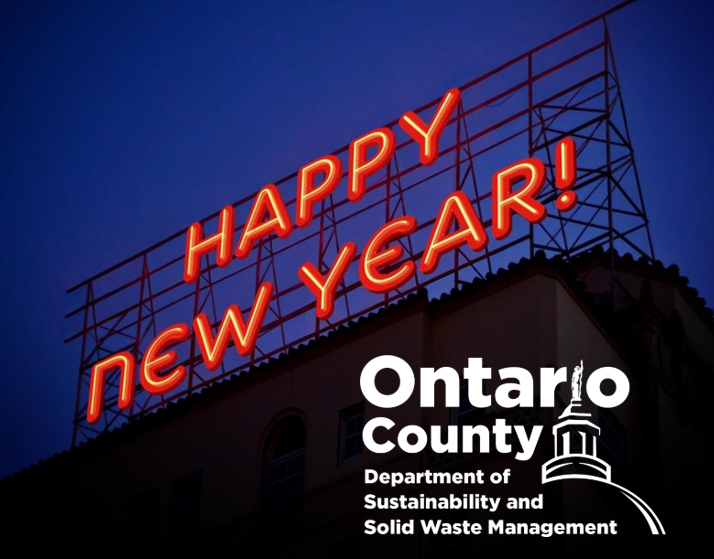 Happy New Year! The New Year is a great time to reset and implement new strategies to reduce waste. It can be overwhelming to know where to start. Try picking one new habit to implement and building from there. Here’s a few ideas to get you started.
Happy New Year! The New Year is a great time to reset and implement new strategies to reduce waste. It can be overwhelming to know where to start. Try picking one new habit to implement and building from there. Here’s a few ideas to get you started.
- Reduce Paper Waste in the Kitchen
Instead of using paper towels, switch to reusable options like wash cloths, Swedish dish cloths, or other options that can be washed and reused. You can make your own from worn out shirts, towels, or sheets. It’s helpful to cut into desired sizes ahead of time and have them on hand to use as needed.
You can also cut paper waste in the kitchen by using reusable napkins instead of paper ones.
- Compost Organic Waste
About 30 percent of the waste Ontario County residents are sending to the landfill are materials that could be composted (for more info click here to see our 2025 Waste Characterization Study). One of the biggest impacts you can have on reducing waste is to start composting either at home or through a drop-off program or curbside service- click here for details and services.
- Make Homemade Cleaning Supplies
Reduce packaging waste and toxins in your home by making homemade cleaning supplies You may already have many of the ingredients needed to make safe and effective cleaners at home. Making your own cleaners protects water quality, saves you money, and can be healthier to use. Vinegar, baking soda, borax, hydrogen peroxide and even citrus peels can be used to make cleaning products.
The acid in citrus and vinegar means that they can kill bacteria, remove mold/mildew, and cut through grease and stains, leaving household items clean and shining.
Visit the NYS DEC's website for more tips on household cleaning products and their greener alternatives. You can also search the internet for the type of material you need to clean for ideas. Always be sure not to combine household chemicals, cleaners, and other products without confirming that they will not cause a dangerous chemical reaction.
- Stop Stocking Disposable Food Packaging
Zip top food storage bags, plastic wrap, and tin foil can be hard to recycle and most often need to be disposed of in the trash. By using reusable storage containers, jars, and beeswax wraps you can reduce the amount of waste you make and may even save some money.
- Give Green Gifts
You can have an even bigger impact by inspiring others with thoughtful gifts. Reusable food storage options, cloth napkins, Swedish dish cloths, and wool dryer balls all make great gifts and encourage others to reduce their waste. Homemade gifts and gifts of an experience also make great options for low waste gifts.